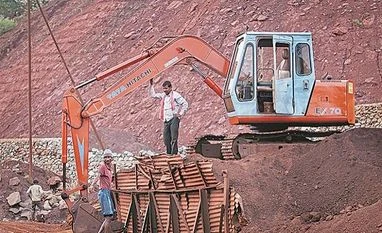The government will in the "next few weeks" start the long-awaited auction of critical minerals, said a senior civil servant on Thursday as he urged the industry to look for the resources abroad too.
The government is working on finalising the auction roadmap, said Sanjay Lohiya, additional secretary in the Ministry of Mines, at the India Mining Summit organised by the Confederation of Indian Industry (CII) in Delhi.
“The auction will start from our ministry in the next few weeks. It will not be one or two rounds in a year but it will depend on the availability of (mineral) blocks and the demand in the market,” Lohiya said.
The plan aligns with India’s pursuit of sustainable development of mineral resources and commitment to fostering innovation and economic growth.
Asked about the minerals that will be auctioned, Lohiya said: “I can't disclose that information at this moment, but everyone will be informed within a couple of weeks.”
Lithium is among critical minerals expected to be put up for auction. The government had earlier announced an auction of 5.9 million tonnes (mt) of lithium reserves discovered in the Reasi district of Jammu & Kashmir (J&K) would conclude by the year’s end.
More From This Section
'Business Standard' first reported about the J&K plan on May 2. Vivek Bhardwaj, who was then secretary in the Ministry of Mines, had said on August 9 that with a Bill securing Parliament’s nod, the ministry is working on shaping the Lithium auction.
The government released on June 28 its first list of 30 key critical minerals, including 17 rare earth elements (REEs) and six platinum-group elements (PGE). They are 'critical' because of their economic importance and limited availability in India’s geological reserves.
Among the minerals featured on the list are antimony, beryllium, bismuth, cobalt and copper.
The government is also set to notify draft rules for exploration licences for critical minerals soon, said Lohiya.
Foreign blocks
To ensure a stable supply chain, India is acquiring critical minerals from foreign nations. Khanij Bidesh India Ltd (KABIL), a joint venture of three public-sector undertakings — National Aluminium Company, Hindustan Copper, and Mineral Exploration Company — was announced in 2019 for this purpose. KABIL acquires from other countries – Argentina and Australia among them – critical mineral assets such as Lithium and Cobalt.
Lohiya also urged the mining industry to procure critical mineral blocks overseas, given the sluggish pace of indigenous operations.
The government will find solutions that help Indian industry in acquiring critical mineral blocks abroad, including the potential provision of fiscal incentives, he said. “We are eager to hear your requirements. Please inform us of the incentives you require so that we can extend every possible assistance.”
The industry has said that to help critical mineral mining the government must designate the entire Obvious Geological Potential (OGP) area across the country as open for exploration, eliminating restrictions on the number of blocks permitted.
)